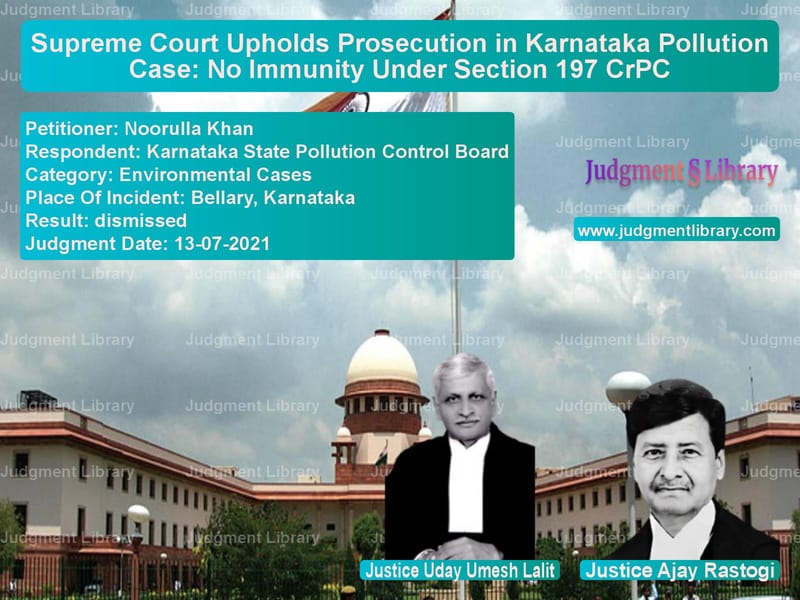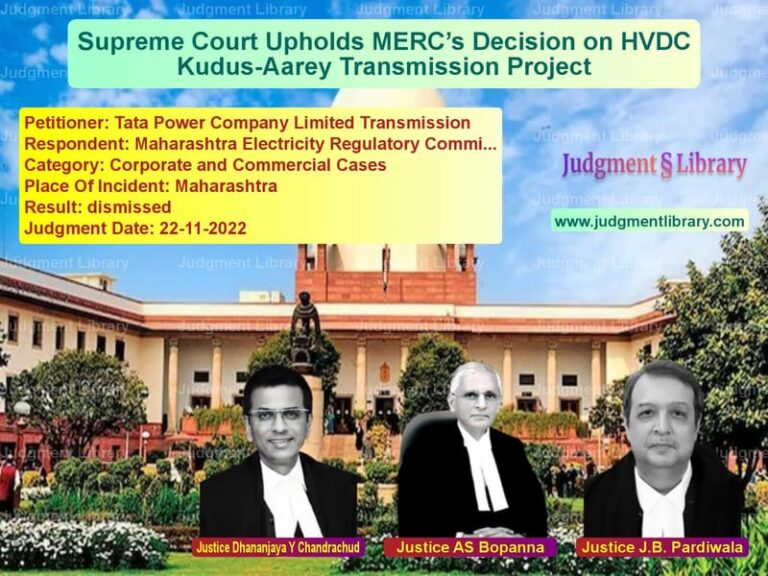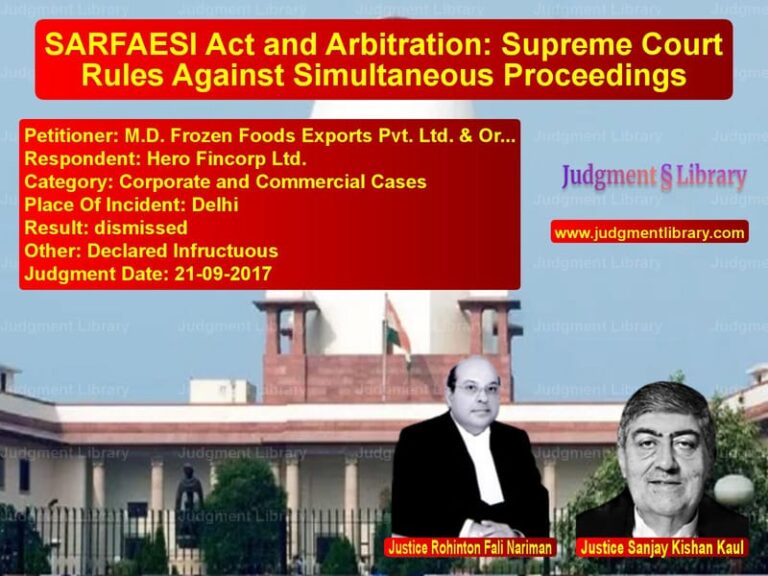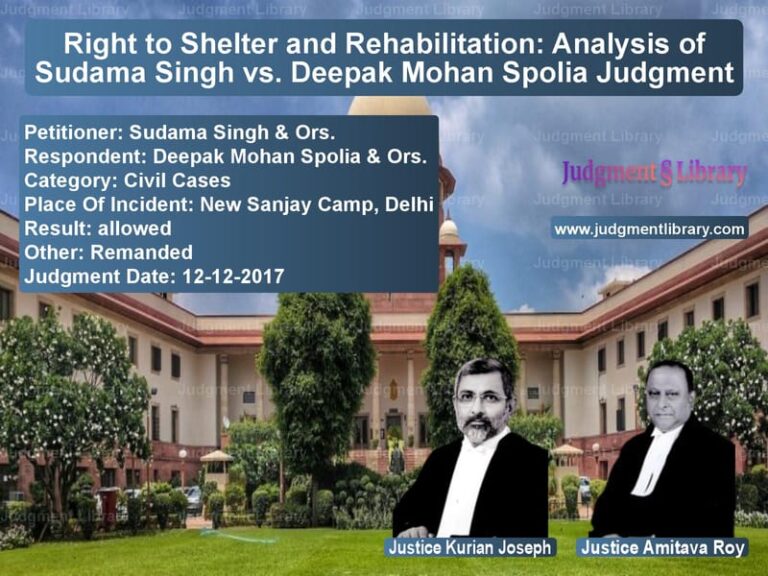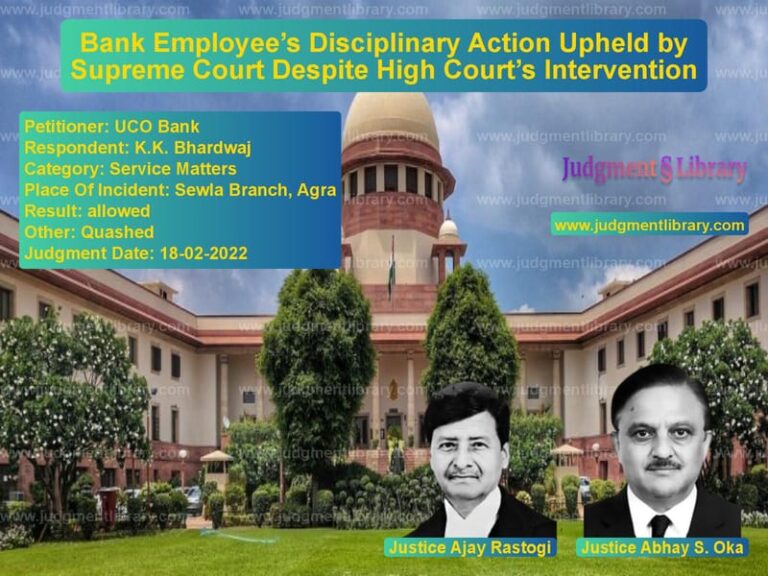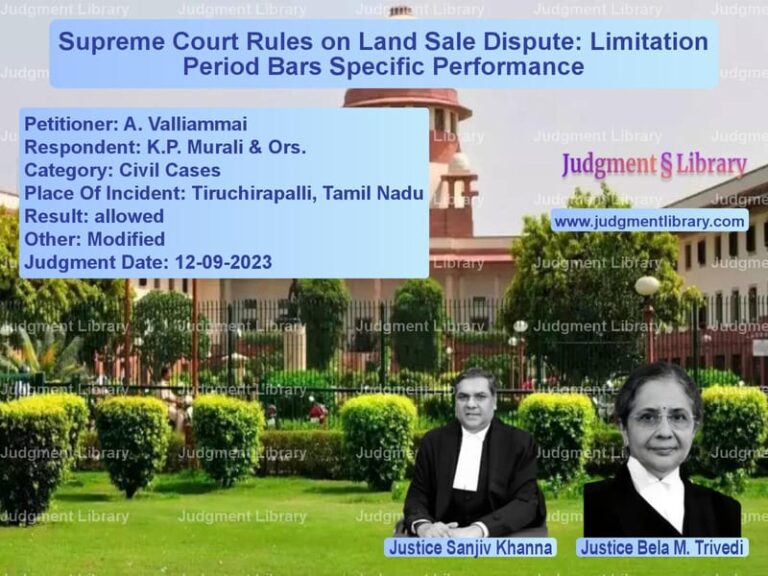Supreme Court Upholds Prosecution in Karnataka Pollution Case: No Immunity Under Section 197 CrPC
The case of Noorulla Khan v. Karnataka State Pollution Control Board is a significant ruling concerning the prosecution of public servants under environmental laws. The Supreme Court ruled that public officials cannot claim immunity under Section 197 of the Code of Criminal Procedure (CrPC) when charged under the Water (Prevention and Control of Pollution) Act, 1974. The judgment reinforces the principle that environmental violations by public officers must be prosecuted without requiring prior government sanction.
Background of the Case
The case originated from pollution violations by the Sandur Gram Panchayat in Bellary, Karnataka. The Karnataka State Pollution Control Board (KSPCB) filed a complaint against the Panchayat and its Chief Officer, Noorulla Khan, alleging non-compliance with pollution control regulations. The trial court convicted the appellant under Sections 43 and 44 of the Water Act, sentencing him to simple imprisonment for one year and six months along with a fine.
The conviction was challenged before the II-Additional Sessions Judge, Bellary, who overturned it on procedural grounds. The appellate court ruled that the prosecution was invalid due to the absence of sanction under Section 197 CrPC, which protects public servants from prosecution for actions performed in their official capacity.
However, the Karnataka High Court reinstated the conviction, holding that Section 197 CrPC did not apply to environmental offences. The appellant then approached the Supreme Court, challenging the High Court’s decision.
Legal Issues Considered
- Whether public servants can claim immunity under Section 197 CrPC for offences under environmental laws.
- Whether pollution control violations fall within the scope of official duties.
- The interpretation of Sections 47 and 48 of the Water Act regarding the liability of public officials.
Petitioner’s Arguments (Noorulla Khan)
The petitioner contended:
- That as a government official, he was acting within the scope of his duties, and prosecution required prior sanction.
- That the High Court erred in ignoring procedural safeguards under CrPC.
- That without government sanction, the prosecution was not legally sustainable.
Respondents’ Arguments (KSPCB)
The Karnataka State Pollution Control Board opposed the appeal, arguing:
- That environmental laws impose direct liability on officials responsible for pollution control.
- That the Water Act, being a special legislation, overrides the general provisions of CrPC.
- That pollution control violations cannot be classified as acts performed in an official capacity.
Supreme Court’s Observations
The Supreme Court upheld the High Court’s ruling, stating:
“Public servants cannot claim immunity under Section 197 CrPC for offences under environmental laws. The provisions of the Water Act override the procedural safeguards of CrPC where environmental violations are concerned.”
The Court emphasized that Sections 47 and 48 of the Water Act impose strict liability on heads of government departments for pollution violations. It held that officials responsible for environmental compliance must be held accountable, and the requirement for prior sanction should not be a barrier to prosecution.
Key Takeaways from the Judgment
- No Immunity for Environmental Offences: Public servants cannot evade prosecution for pollution-related offences under the guise of official duty.
- Water Act Prevails Over CrPC: The ruling clarifies that special environmental laws take precedence over general procedural safeguards.
- Strict Liability for Officials: Government officials responsible for compliance with pollution laws bear personal responsibility for violations.
- Strengthening Environmental Governance: The judgment reinforces strict enforcement of environmental laws against public officials.
Conclusion
The Supreme Court’s decision in Noorulla Khan v. KSPCB is a landmark ruling ensuring that government officials do not misuse procedural protections to escape liability for environmental violations. By holding that the Water Act prevails over Section 197 CrPC, the judgment strengthens environmental law enforcement and promotes accountability in public administration.
Petitioner Name: Noorulla Khan.Respondent Name: Karnataka State Pollution Control Board.Judgment By: Justice Uday Umesh Lalit, Justice Ajay Rastogi.Place Of Incident: Bellary, Karnataka.Judgment Date: 13-07-2021.
Don’t miss out on the full details! Download the complete judgment in PDF format below and gain valuable insights instantly!
Download Judgment: noorulla-khan-vs-karnataka-state-poll-supreme-court-of-india-judgment-dated-13-07-2021.pdf
Directly Download Judgment: Directly download this Judgment
See all petitions in Environmental Cases
See all petitions in Public Interest Litigation
See all petitions in Constitution Interpretation
See all petitions in Judgment by Uday Umesh Lalit
See all petitions in Judgment by Ajay Rastogi
See all petitions in dismissed
See all petitions in supreme court of India judgments July 2021
See all petitions in 2021 judgments
See all posts in Environmental Cases Category
See all allowed petitions in Environmental Cases Category
See all Dismissed petitions in Environmental Cases Category
See all partially allowed petitions in Environmental Cases Category

